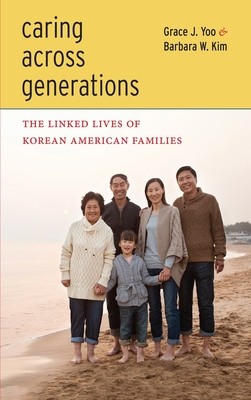
- We will send in 10–14 business days.
- Author: Grace J Yoo
- Publisher: New York University Press
- ISBN-10: 0814768970
- ISBN-13: 9780814768976
- Format: 16.1 x 23.7 x 2.3 cm, hardcover
- Language: English
- SAVE -10% with code: EXTRA
Reviews
Description
More than 1.3 million Korean Americans live in the United States, the majority of them foreign-born immigrants and their children, the so-called 1.5 and second generations. While many sons and daughters of Korean immigrants outwardly conform to the stereotyped image of the upwardly mobile, highly educated super-achiever, the realities and challenges that the children of Korean immigrants face in their adult lives as
their immigrant parents grow older and confront health issues that are far more complex. In Caring Across Generations, Grace J. Yoo and Barbara W. Kim explore how earlier experiences helping immigrant parents navigate American society have prepared Korean American children for negotiating and redefining the traditional gender norms, close familial relationships, and cultural practices that their parents expect them to adhere to as they reach adulthood. Drawing on in-depth interviews with 137 second and 1.5 generation Korean Americans, Yoo & Kim explore issues such as their childhood experiences, their interpreted cultural traditions and values in regards to care and respect for the elderly, their attitudes and values regarding care for aging parents, their observations of parents facing retirement and life changes, and their experiences with providing care when parents face illness or the prospects of dying.
EXTRA 10 % discount with code: EXTRA
The promotion ends in 17d.08:52:55
The discount code is valid when purchasing from 10 €. Discounts do not stack.
- Author: Grace J Yoo
- Publisher: New York University Press
- ISBN-10: 0814768970
- ISBN-13: 9780814768976
- Format: 16.1 x 23.7 x 2.3 cm, hardcover
- Language: English English
More than 1.3 million Korean Americans live in the United States, the majority of them foreign-born immigrants and their children, the so-called 1.5 and second generations. While many sons and daughters of Korean immigrants outwardly conform to the stereotyped image of the upwardly mobile, highly educated super-achiever, the realities and challenges that the children of Korean immigrants face in their adult lives as
their immigrant parents grow older and confront health issues that are far more complex. In Caring Across Generations, Grace J. Yoo and Barbara W. Kim explore how earlier experiences helping immigrant parents navigate American society have prepared Korean American children for negotiating and redefining the traditional gender norms, close familial relationships, and cultural practices that their parents expect them to adhere to as they reach adulthood. Drawing on in-depth interviews with 137 second and 1.5 generation Korean Americans, Yoo & Kim explore issues such as their childhood experiences, their interpreted cultural traditions and values in regards to care and respect for the elderly, their attitudes and values regarding care for aging parents, their observations of parents facing retirement and life changes, and their experiences with providing care when parents face illness or the prospects of dying.


Reviews